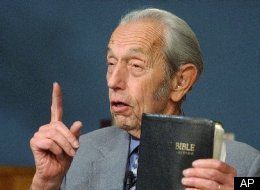[Note: Many thanks to those who have shared this letter. Thanks to Ed, Dillon, Collin, and others who’ve posted links so far. Please consider connecting with me on Facebook or Twitter, and please see the UPDATE at the end.]
When people say, “It’s not the end of the world,” they usually mean those words to be comforting. Yet those words will not be comforting to you. Not today. That the Day of the Lord did not arrive when you had expected it to arrive will be a source of profound disappointment, of embarrassment, and perhaps — now or in the days to come — of disillusionment with your faith.

You were wrong. Let’s face that fact. You were confidently wrong. You believed with all the fervency of a hopeful heart, a heart that longed to see God and longed to see the day when suffering would cease and justice would reign and the truth of God would be made known. When people mocked you for what you believed, you thought to yourself, Just wait and you’ll see. Today I will be thought a fool for Christ; tomorrow the world will see that we were right.
Harold Camping, the 89-year-old founder of the Family Radio Network, used his broadcast empire, two thousand billboards and a flood of tracts and posters to warn the world that Judgment Day would arrive on May 21. He expected earthquakes that would spread across the world; two percent of the world’s population would be raptured to heaven while the rest would be left behind for tribulations. You believed it. You kept in prayer throughout the day, you shared important words with your loved ones, and you waited eagerly for the news you were sure would come. Yet the earth never shook. This day was just like so many other Saturdays before it. The sun rose, the sun fell, and the world kept turning.
Now, some of you may be wondering: What happened? Did God change his mind? What if Mr Camping was just a day or two off? Perhaps the Gregorian calendar has not been perfectly kept, or perhaps Christ was crucified a day later than Mr Camping had suspected, and so perhaps we have not yet reached 722,500 days since Golgotha? If you’re asking yourself these things, this letter is not for you — yet. But I hope you’ll bear it in mind and return when you’re ready. Because, my brother, my sister, I think we’ll all still be here a week from now, a month from now, a year from now.
This letter is more for those who are wondering: How did this happen? Why was I deceived? Why did God allow me, when I sought the truth in prayer, to believe this and go into the cities and distribute flyers and tell my loved ones that they should prepare for the Day of Judgment? How do I face the mockers now? And how do I know that my faith as a whole is not a falsehood as well? When I once went about with my youth group or college group or small group and proclaimed the gospel, and told people earnestly that Christ had died for them and that they should receive God’s gracious offer before the end — was believing that and pronouncing that any different than believing and pronouncing that May 21st was Judgment Day? What if it’s all just a silly story, and I’m a fool to believe it?
Tonight the Rapture Parties will go on. The atheists will gloat, the mockers will mock. Yet there’s nothing funny about this for you. You are broken and crestfallen, left abandoned in the ruins of unfulfilled expectations, among them the very highest expectations a human can have — the hope of union with God, the hope of a world made new, the hope that every tear will be wiped away. You are left disoriented. You were so sure of this. People you love and respect — perhaps your parents, your pastor, your mentor, your brother and sister — may have believed it too. You do not feel relieved that the end of the world did not arrive. You are not rid of this world yet, so all of its weight fell back upon your shoulders.
So let’s reflect on this together. First, what can be affirmed? What were you right to feel and to believe?
- Your heart was in the right place. This may sound like a minor matter, or it may sound like condescension, but I assure you it’s not. This is a rare and exceedingly important thing. It’s perfectly right to yearn for the day of Christ’s return. It’s right to desire with all of your heart that you could be with God right now. “Better is one day in your courts,” writes the Psalmist (84:10), “than thousands elsewhere.” You longed to be in those courts together with the saints. It is a good thing to thirst for God and to look forward to the day when God’s truth and grace and justice will be made known to all humankind. I believe that desire is precious to God.
- You were right to believe that God will, one day, gather his children unto himself and draw history as we know it to a close. The most persuasive falsehoods are always the ones that contain the greatest proportion of the truth. Although only a very small slice of the Christian community believed that Judgment Day was arriving on May 21st, the vast majority of the church around the globe and throughout its history has believed that Christ would come again to bring judgment and restoration, and ultimately the beginning of a new age of peace and justice. We should always live as though Christ’s return is imminent. Today is always the day of salvation.
- You were right to spread the warning. It’s important to say this, because the Harold Camping prophecy and the movement he mobilized will be used by the skeptical press to make Christians in general look silly. Yet given what you believed was coming, it would have been irresponsible and unloving in the extreme if you had chosen not to spread the news as broadly as possible. Some will jeer at the billboards that were rented and the literature that was distributed. Given your sincere belief that the end was near, sounding the alarm was the only loving option.
Second, what can be learned? What might you learn from this experience? I would suggest, in humility, five things:
- Our faith is not placed in a person or in a prediction, but in the good news of Jesus Christ. The fashionably skeptical will be eager to tell you that you are wrong about your faith in Jesus just as you were wrong about the arrival of Judgment Day. Yet these things are worlds apart. The core of the gospel message has stood strong for two thousand years. It is communicated plainly in the scriptures and has undergone extraordinary scrutiny historically, philosophically, theologically and in every other way — and it has survived and thrived and spread and it is preached throughout the church all over the world. The belief that Judgment Day would arrive on May 21st was held by only a vanishingly small minority for a very small period of time; it was not revealed (at least not plainly so) in the scriptures themselves and most Christians did not think it stood up to scrutiny. Further, charismatic people come and go, and some propose new ideas and exciting interpretations of God’s Word. Yet our confidence in them should never be equal to our confidence in Christ. People and predictions come and go, but the Word of the Lord endures forever.
- No one knows when the end will come–so we must always be ready. Jesus tells us specifically (Mark 13:32) that no one knows when the end will come. Mr Camping had ways of explaining that passage away, but I think we can agree that he should have taken that passage at face value. It’s one thing to interpret the times. It’s another to set dates on the basis of obscure mathematical formulae. To be sure, there are many mysteries in our faith. But that which can be known, and that which must be known, God has made known to us quite clearly. God does not conceal important truths in esoteric codes so that only the ultra-enlightened can figure them out. We do not know when the end will come — and this means that we must always live as though it will come tomorrow, and today is the last today to make things right with God and with God’s children.
- We should remember the difference between scripture and an interpretation of scripture. The Christian scriptures did not say that May 21st would be Judgment Day. Harold Camping’s prediction was based on an interpretation of the scriptures that used some obscure tools and methods. An interpretation of the scripture does not have the same force as what the scripture says so plainly that no interpretation is required. So what was disproven in this case is not the scripture itself — not remotely — but an interpretation.
- We should always beware the power of charismatic leaders and groupthink to sway our beliefs. I do not believe that Harold Camping is a crackpot or a cult leader, though some will construe him as such. I believe that he got caught up in a particular way of looking at the scriptures, and was eventually surrounded by people who believed likewise. I would guess it probably gave him a sense of extraordinary insight and excitement to believe that he could find hidden truths in the scripture that others could not. He should have been humbler. But his followers should also have been more critical, quicker to test him, and less quick to explain away the inconsistencies. They also should have listened to the gentle criticisms and encouragements they received from fellow believers who did not accept the May 21st prophecy. In any case, I will soon be writing a series on this blog on why we believe the things we believe, and I hope you’ll subscribe and follow along.
- Finally, we should never believe that we’ve got God figured out. God always confounds our expectations. Sometimes we have to die to one way of thinking about God in order to come alive to a new one. And yet soon, even that new way of thinking about God may become an idol as we begin to think that this new way of thinking about God has God figured out, has God in a box. If some of you find that “your faith” is crumbling as the reality dawns that you believed in a falsehood, let me suggest to you, gently, that any faith that capsizes when Judgment Day fails to arrive is not a proper faith to begin with. If your faith is shattered here, then your faith was not in God but in a particular way of thinking about God and God’s plans. There’s a very important difference between the two.
When you want to believe something, and someone you respect tells you to believe something, and everyone around you also believes and wants to believe the same thing, those are extraordinarily powerful forces. I wish that you had not believed in the May 21st prediction, because I fear that it damaged the credibility of Christians in the eyes of some. But I see no reason now to belabor that point. Rather, I hope you have grace with yourselves. Those forces operate not only in religious groups. They operate in political movements, activist groups, even in enclaves within scientific communities. In fact, when your friendly neighborhood atheist mocks you for what you believed, you can point him or her to scientific evidence that atheists in general are more gullible.
And you know what? God has a way of using even our mistakes. Perhaps your expectation of the imminent return of Christ helped you assess your life, remember what’s important, reconcile with your brother or your sister, take refuge in God’s gracious provision for sin in the work of Jesus Christ, and pray with great fervency that you have lived a life worthy of the gospel. If you did all these things, then perhaps you should not regret that you were wrong about the whence.
UPDATE: The response to this letter has been heartening. Among the critical responses, however, about half have said that I should have been harder on Harold Camping himself. Honestly, the letter was written for those who followed Camping’s teachings, but I added “Harold Camping and…” into the title at the last moment. (You’ll note the letter never really addresses him.) That said, I think the commenters have a point. The consequences of Camping’s false teaching have been, for many families, devastating. Fellow believers need, lovingly but firmly, to encourage him to confess his error, seek forgiveness, and seek most of all to make amends. To the extent that he is able to use his resources to help families recover from the wreckage his teaching has wrought, I hope and pray that he will. In any case, there will be a time to call for accountability from Harold Camping. It seemed to me, however, and still does seem to me, that now is a time rather to reach out lovingly to those who were misled by him.
I have a few other comments in this most recent post, as well.










